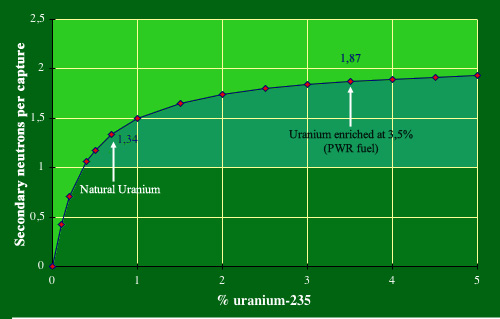Natural uranium or uranium enrichiched in isotope 235
Natural uranium has long been the only nuclear fuel available for reactors, since many .countries had no access to enrichment facilities or not enriched uranium. The first nuclear power plants built were operated with natural uranium. Their operation was difficult because of the scarcity of the fissile isotope uranium-235 in the fuel. Nowadays, almost all reactors use enriched uranium.
Uranium is a chemically rare atom. Natural resources are limited. The resources in fissile uranium-235, whose isotopic abundance is only 0.7%, are more than an hundred times rarer.

Neutrons available for fission in uranium fuels
It is easier to run a reactor loaded with enriched uranium than with natural uranium. The number of secondary neutrons produced on average by slow neutron capture in uranium nuclei increases with the amount of the fissile uranium-235 isotope. For the sustainability of chain reaction, this number should be significantly higher than 1 to compensate for losses: this condition holds comfortably with fuel enriched to 3.5% as that of PWRs but marginally with natural uranium which contains only 0.7% uranium-235.
© IN2P3
Most reactors today use a degree of enrichment between 3 and 4.5%. Once introduced into the reactor, the fuel composition changes. The fuel is depleted, the operating conditions vary. A fraction of the fissile uranium-235 is replaced by plutonium-239 which is also fissile. Minor actinides, nuclei heavier than uranium, accumulate, as well as fission products. Both are highly radioactive.
The spent fuel must be unloaded from the reactor core after three to four years. The uranium that comes out is still richer in the isotope 235 than natural uranium. After reprocessing the spent fuel, it is possible enrich again this uranium in order to recycle it as a fresh fuel.
The reprocessing of the spent fuel in France at La Hague plant allows to separate plutonium and to mix plutonium, which is fissile, with uranium to produce a mixed fuel, called MOX. The MOX fuel is used in some French PWR reactors tranformed to accept this fuel.
Some specific reactors operate with a fuel containing a much higher proportion of fissile nuclei than the commercial reactors producing electricity. They serve to propel submarines, aircraft carriers and icebreakers, ensuring their autonomy. The core of these embarked reactors is compact. Fast breeder reactors uses also fuels rich in fissile nuclei.
Other articles on the subject « Nuclear Fuel »
Cycle Front End
From the extraction of uranium to the fuel fabrication The front-end of the nuclear cycle is the [...]
Isotopic Separation
The access key to the fuel of modern nuclear power plants … and to atomic weapons The uranium fue[...]
Ultracentrifugation
A separation process economical in energy, but proliferating The principle of centrifuges has lon[...]
Gaseous Diffusion
The first enrichment process, a large consumer of electricity The gaseous diffusion process was t[...]
PWR fuel assemblies
Fuel assemblies in the core of PWR Reactors The core of a pressurized water reactor (PWR) is cont[...]
Reactor fuel layout
Fuel assemblies in the core of nuclear reactors The nuclear fuel assemblies, that vary from one r[...]
Plutonium Use
A fissile element produced in nuclear reactors In February 1941 the American physicist Glenn Seab[...]
Pu : Fuel, bomb or Waste ?
Plutonium dark and bright sides … Sensitive material, like the roman god Janus, plutonium h[...]
MOX fuels
Introducing plutonium in nuclear fuels For energy production, plutonum is gold ! One gram of plut[...]
Thorium Fuels
Uranium 233: a fissile nucleus made from thorium Thorium is more abundant than uranium in the Ear[...]